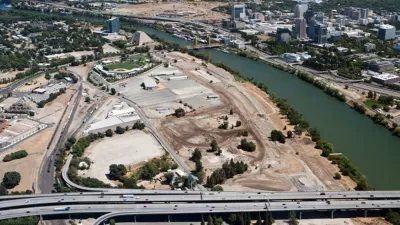The State Supreme Court struck down redevelopment. Now it's up to the political players in California to strike a deal to bring it back. Can they do it? And what will the state's price be?
The California Supreme Court killed redevelopment this morning, but that doesn't mean it's dead.
At first glance it would seem as though redevelopment agencies have no bargaining power at all. After all, it's hard to imagine a weaker position than a state Supreme Court ruling saying you don't exist.
But don't forget the most important point about the redevelopment battle: It's not about redevelopment. It's about money.
So this morning's court ruling is likely only an interim step. Both sides will likely be back in the Legislature within a matter of days to try to work out a deal that keeps redevelopment in some form, but transfers a couple of billion dollars of property tax revenue to the state. The big question is whether the state will seek to extract substantive reform from the redevelopment agencies as part of the deal.
In the meantime, however, California's $6 billion redevelopment system has been thrown into uncertainly. Technically, at least, no redevelopment agencies exist and no redevelopment activities can move forward. Counties and school districts will presumably move forward in creating the oversight committees required under the law to take over and dispose of redevelopment agency assets.
Thanks to Bill Fulton
FULL STORY: Redevelopment Will Be Back -- But At What Price?

Planetizen Federal Action Tracker
A weekly monitor of how Trump’s orders and actions are impacting planners and planning in America.

Maui's Vacation Rental Debate Turns Ugly
Verbal attacks, misinformation campaigns and fistfights plague a high-stakes debate to convert thousands of vacation rentals into long-term housing.

San Francisco Suspends Traffic Calming Amidst Record Deaths
Citing “a challenging fiscal landscape,” the city will cease the program on the heels of 42 traffic deaths, including 24 pedestrians.

Defunct Pittsburgh Power Plant to Become Residential Tower
A decommissioned steam heat plant will be redeveloped into almost 100 affordable housing units.

Trump Prompts Restructuring of Transportation Research Board in “Unprecedented Overreach”
The TRB has eliminated more than half of its committees including those focused on climate, equity, and cities.

Amtrak Rolls Out New Orleans to Alabama “Mardi Gras” Train
The new service will operate morning and evening departures between Mobile and New Orleans.
Urban Design for Planners 1: Software Tools
This six-course series explores essential urban design concepts using open source software and equips planners with the tools they need to participate fully in the urban design process.
Planning for Universal Design
Learn the tools for implementing Universal Design in planning regulations.
Heyer Gruel & Associates PA
JM Goldson LLC
Custer County Colorado
City of Camden Redevelopment Agency
City of Astoria
Transportation Research & Education Center (TREC) at Portland State University
Jefferson Parish Government
Camden Redevelopment Agency
City of Claremont



























